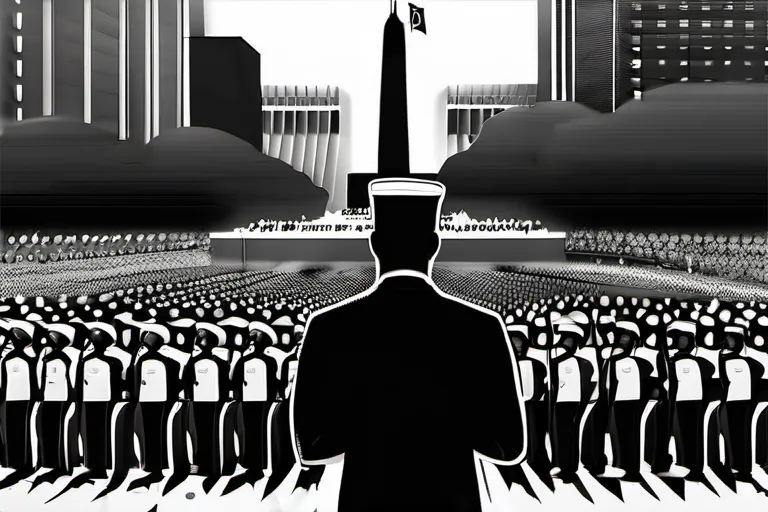Unravel the history, beliefs, and impact of the Nation of Islam
The Nation of Islam (NOI) is a religious and political organization founded in the United States in 1930 by Wallace Fard Muhammad. This article provides an in-depth exploration of its origins, teachings, leadership, and contributions to African American history.
The Birth of the Nation of Islam
The story of the Nation of Islam begins like a seed, planted by Wallace Fard Muhammad in Detroit during the 1930s. Who was this enigmatic figure that would give birth to such a profound movement? Was he a messianic figure, or perhaps a clever organizer with a vision for change? Some believe he was a spiritual leader with deep-rooted knowledge of Islam, while others see him as a charismatic con artist. Regardless, his disappearance in 1934 left a lasting impact on the community he had rallied around.
Elijah Muhammad took over leadership from Wallace Fard Muhammad and turned the Nation of Islam into a powerful organization. He taught that Islam was not just a religion but a way of life, emphasizing self-reliance and economic empowerment for African Americans. His teachings were infused with an understanding of race relations in America, where black people faced systemic oppression. Under his guidance, the Nation of Islam grew from a small group to a national movement, influencing thousands.
How did Elijah Muhammad transform the organization? By focusing on education and the betterment of the community, he instilled a sense of pride and purpose among its members. He emphasized the importance of knowledge as a tool for liberation, encouraging his followers to read widely—especially works by black scholars like Booker T. Washington and W.E.B. Du Bois. Through these teachings, Elijah Muhammad created an environment where individuals could find their voice and contribute positively to society.
The Nation of Islam’s impact was profound, not just within its own ranks but also in the broader context of civil rights movements. Its emphasis on self-help and economic independence inspired countless African Americans during a time when racial discrimination was rampant. How did it influence leaders like Malcolm X, who initially joined as a member before becoming one of the most prominent voices for black empowerment? The answer lies in the powerful blend of spiritual guidance and practical strategies that Elijah Muhammad provided.
The birth of the Nation of Islam is a story woven with threads of hope, struggle, and resilience. It’s a tale of transformation through belief and community building, where each member played a role in shaping its destiny. The journey from its founding to its evolution under Elijah Muhammad remains a pivotal chapter in American history, offering lessons on leadership, faith, and the enduring quest for equality.
Key Teachings and Beliefs
What are the core teachings that truly define the Nation of Islam? How do these beliefs shape its members and influence their daily lives? The key teachings and beliefs of the Nation of Islam delve into a unique interpretation of Islam, blending traditional Islamic principles with African-American cultural identity and socio-political activism. Imagine a garden where seeds of faith have been sown but in a way that makes them flourish uniquely among people of color.
One of the most foundational teachings is the belief in Africa as the promised land for Black Americans. This idea isn’t just geographical; it’s about reclaiming and honoring one’s African heritage, seeing oneself as part of a global community that shares a common struggle and destiny. How does this concept empower its followers to see themselves differently, not just as victims but as agents of change?
The Nation of Islam also emphasizes the importance of knowledge as power. It teaches that through education, one can rise above oppression and ignorance. How does this belief translate into practical actions? Are there specific educational programs or resources within the community that reflect this emphasis on learning and enlightenment?
Another key aspect is the concept of black nationalism. This is not about hate or exclusion but rather about fostering a sense of pride, unity, and self-reliance among African Americans. How does this belief manifest in the day-to-day practices within the community? Are there cultural events or activities that celebrate black heritage and promote solidarity?
The teachings also include a unique interpretation of the Prophet Elijah Muhammad. He is often revered as a prophet, a messenger of God sent to guide Black people. This belief shapes not just religious practice but also community structure and leadership. How does this perspective influence the way members view their leaders and their role within the broader society?
The Nation of Islam’s teachings on justice and equality extend beyond personal faith practices into social activism. From fighting against racial injustice to promoting economic empowerment, these beliefs drive its engagement with the wider world. Can you see how these principles are applied in real-world contexts? How do they influence the community’s response to contemporary issues like police brutality or systemic racism?
By exploring these teachings, we gain a deeper understanding of what drives the Nation of Islam’s mission and its impact on American society. These beliefs aren’t just words—they shape lives and communities, making the Nation of Islam more than just a religious organization but a powerful force for change.
The Role of Leaders
The role of leaders in any organization can be likened to the heart of a tree, providing life and sustenance. In the Nation of Islam (NOI), two figures stand out as vital to its history and impact: Malcolm X and Louis Farrakhan. Both men wielded their influence like a double-edged sword, capable of inspiring and challenging their followers in profound ways.
Malcolm X was initially known for his fiery rhetoric, advocating for Black self-reliance and pride. He challenged the status quo with questions that sparked introspection: Why must we be inferior? Why should our children believe they are less than white people? His charismatic leadership and powerful oratory skills made him a symbol of resistance against oppression.
Farrakhan, on the other hand, stepped into the spotlight after Malcolm X’s assassination. He took over the leadership with a different approach but retained much of the core principles. Farrakhan’s role was more about maintaining continuity while also seeking to bridge gaps within and outside the community. His speeches often centered around unity and the need for Black people to unite under one banner, asking rhetorical questions like: Can we truly achieve our goals without coming together?
The contrast between Malcolm X’s radical stance and Farrakhan’s more reconciliatory approach is a testament to the fluidity of leadership within the NOI. Both leaders contributed significantly to shaping the organization’s identity, pushing it towards different yet complementary directions.
Reflecting on their roles, one can see how they were not just leaders but also architects of change. They used rhetoric as a tool to awaken the dormant spirit in their followers, much like a painter uses brushstrokes to bring a canvas to life. Their legacies continue to influence discussions about race, identity, and empowerment within American society.
The NOI’s Contributions to Black Empowerment
The Nation of Islam (NOI) has been a cornerstone for African American empowerment, fostering a sense of pride and unity that resonates far beyond its spiritual teachings. How did this organization manage to become such a pivotal force in black communities? Could it be through its emphasis on self-determination and economic empowerment?
One cannot fully understand the impact of the Nation of Islam without delving into how it instills a sense of identity among African Americans. The NOI encourages members to embrace their heritage, teaching that every individual has the power to shape their destiny. This is akin to planting seeds in fertile soil; over time, they grow strong and resilient, ready to weather any storm.
Through its leadership, the Nation of Islam has championed education as a tool for liberation. Think of it like building a ladder; each rung represents knowledge, allowing individuals to rise above their circumstances. By promoting literacy and providing educational resources, the NOI empowers members to challenge societal norms and advocate for their rights.
Moreover, the economic initiatives spearheaded by the Nation of Islam have transformed communities from within. Think about it as nurturing a garden; while external factors can influence growth, ultimately, it’s the care and attention given that determine its success. The establishment of businesses like Muhammad College and various ventures has not only provided jobs but also fostered self-reliance among members.
The NOI’s teachings on health and nutrition further contribute to overall well-being. By emphasizing natural living and holistic practices, they provide a framework for physical and mental wellness that is often overlooked in mainstream society. This holistic approach can be seen as providing a balanced diet not just for the body but also for the mind.
Ultimately, the Nation of Islam’s contributions to black empowerment lie in its multifaceted approach to community development. It addresses the social, economic, and spiritual needs of African Americans, creating an environment where individuals can thrive. By nurturing this growth, the NOI has played a crucial role in shaping not only the lives of its members but also the broader narrative of racial equality in America.
The Nation of Islam Today
Today, the Nation of Islam (NOI) continues to be a significant presence in American society, its influence felt across various sectors from politics to social justice movements. How has it managed to maintain relevance in today’s world? Is it still seen as a radical group or is there a broader acceptance now?
The NOI’s contemporary impact can be explored through several lenses. First, consider how it addresses contemporary issues. The NOI often focuses on economic empowerment and racial equality, themes that remain pertinent in today’s society. How does it leverage these themes to advocate for its followers? Can we see a shift from its past teachings towards more inclusive and mainstream ideologies?
The group has also been involved in various political movements. For instance, former leader Louis Farrakhan continues to be influential in the Black Lives Matter movement. How does this participation shape public perception of the NOI? Does it help or hinder its efforts to bridge the gap between traditional and modern civil rights activism?
Educational programs are another area where the NOI has made significant strides. Through initiatives like the Muhammad University of Islam, the group aims to provide educational opportunities that go beyond what mainstream institutions offer. How effective have these programs been in fostering a sense of community and empowerment among its members?
Moreover, the NOI’s role in media has evolved over time. From being largely ignored or criticized by mainstream media, it now engages more openly with various platforms to share its message. How does this engagement impact its reach and influence? Are there specific strategies used to ensure their message is heard?
The future outlook of the NOI remains uncertain but promising. With ongoing debates about race relations and social justice in America, the group may find new avenues to promote its goals. However, it also faces challenges from internal divisions and external scrutiny.
Will the NOI continue to be a voice for those seeking empowerment and equality? Or will it become just another footnote in the history of American religious movements?
The answers to these questions depend on how the NOI navigates the complex landscape of contemporary issues. Whether through its ongoing educational initiatives, political activism, or media engagement, the group’s future holds both opportunities and challenges.
Criticisms and Controversies
The Nation of Islam (NOI) has faced its fair share of criticisms and controversies over the years, challenging its image and credibility. Some critics argue that NOI’s teachings are too focused on racial segregation, a stance that seems at odds with modern multicultural societies. But can’t we consider this viewpoint through the lens of historical context and social realities of the time?
Another criticism centers around NOI’s leadership and its alleged involvement in political assassinations. Figures like Malcolm X, once a prominent voice within the organization, were met with mixed reactions. While some saw him as a visionary leader, his assassination sparked questions about the inner workings of the Nation of Islam. Was it merely an isolated incident or part of a larger pattern?
The controversial nature of NOI’s teachings on women and sexuality has also drawn significant attention. Critics point to what they see as restrictive views that limit personal freedom and empowerment. Yet, these same issues are complex and multifaceted, reflecting broader societal debates about gender roles and equality. Can we truly understand the context in which such beliefs were formed without dismissing them outright?
The organization’s evolution from a racial separatist group to one that now advocates for racial unity has been met with mixed reactions. Some view this shift as a sign of maturation, while others see it as an attempt to dilute NOI’s original message and appeal. Is the journey towards reconciliation inherently flawed?
Noelani Arista, in her book ‘American Islamic: The Nation of Islam from Occultation to Revolution,’ provides insights into how NOI’s approach to social change has shifted over time. Her work underscores that the organization’s stance on various issues is not static but dynamic and responsive to changing societal conditions.
Despite these criticisms, it is essential to recognize the significant impact the Nation of Islam has had on American society. The organization’s contributions to civil rights, educational programs, and community development are undeniable. Can we overlook this impact in favor of focusing solely on its perceived shortcomings?
The critiques faced by NOI reflect deeper questions about identity, race, and social justice in America. As the Nation of Islam continues to evolve, it will need to address these criticisms while also maintaining its core values. The road ahead is complex, but so too are the challenges facing any organization striving for meaningful change.
Conclusion
 Exploring the Nation of Islam offers insights into the rich tapestry of Black religious identity and activism. Understanding its influence can help us appreciate its continued relevance today.
Exploring the Nation of Islam offers insights into the rich tapestry of Black religious identity and activism. Understanding its influence can help us appreciate its continued relevance today.











